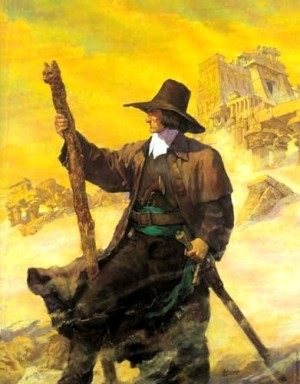The Savage Tales of Solomon Kane
The Savage Tales of Solomon Kane
by Robert E. Howard
$15.95; 414 pages

Solomon Kane [Amazon link], the Puritan avenger. I loved the character from the moment I heard of him. He cuts quite a dashing figure despite, or perhaps because of his somber mode of dress. Kane is not very representative of Puritans, but he nonetheless embodies the stereotype quite well. Fanatical in personality, unadorned in both speech and deportment, and convinced of the absolute sovereignty of God.
He never sought to analyze his motives and he never wavered once his mind was made up. Though he always acted on impulse, he firmly believed that all his actions were governed by cold and logical reasonings. He was a man born out of his time--a strange blending of Puritan and Cavalier, with a touch of the ancient philosopher, and more than a touch of the pagan, though the last assertion would have shocked him unspeakably. An atavist of the days of blind chivalry he was, a knight-errant in the somber clothes of a fanatic. A hunger in his soul drove him on and on, and urge to right all wrongs, protect all weaker things, avenge all crimes against right and justice. Wayward and restless as the wind, he was consistent in only one respect--he was true to his ideals of justice and right. Such was Solomon Kane.
I think the most remarkable facet of his personality is his steadfastness. Swashbuckling heroes of penny dreadfuls typically wield a sword pretty well, but Kane is completely incorruptible. There is simply no point in trying to tempt him because he knows God always triumphs in the end, so there is no point in delaying the inevitable. In fact, he might as well just get on with killing the wicked and be done with it.
My favorite story of the collection is Wings in the Night. Kane finds the remnant of a colony of harpies driven south into Africa by Jason in the Age of Heroes. He fights off an attack by the harpies, and badly wounded, recuperates in a local village that has been forced to offer up a sacrifice from amongst themselves in exchange for the protection afforded by the proximity of the harpies against the more vicious tribes living nearby. Initially, the village enjoys a period of respite because the harpies fear Kane, but eventually they simply decide to massacre the villagers for sport whilst avoiding Kane as best they can.
Uncharacteristically, Kane curses the heavens for the cruelty of the world, because the villagers had placed a naive trust in him that he knew would come to naught. Yet he could not leave them to the harpies, and he did not have the weapons to overcome the harpies' superior numbers, so he simply waited until doom arrived. Kane of course cleanses the earth of the vile creatures, the but the cost is terrible. There is no attempt to justify this in the name of a greater good or explain God's ways to man, Kane simply avenges the fallen and moves on.
An interesting facet of the Kane stories is the idea that the old magic is fading away from the world. Kane, being a tool of God's justice, always defeats the evil creatures he finds before him, even when greater men than he have previously failed. Like the work of his friend Lovecraft, the world of Solomon Kane is full of dark magic that is literally incomprehensible to mere men, but unlike Lovecraft's worlds, justice does indeed prosper at the hands of Solomon Kane. I was reminded of Tim Powers' The Drawing of the Dark and The Anubis Gates.
In both of these books, strange magic lingers from the early ages of the world, but the reign of magic over the Earth has been forever broken, even though a vestige of its former power remains. For Powers, there is indeed a pivotal act in history that has rendered everything forever different, and there is a likeness to be seen in Solomon Kane. Kane vanquishes a demon sealed away in East Africa by King Solomon himself, precisely because he is a lesser man than King Solomon. Unlike his namesake, Kane serves faithfully, and so can now vanquish what was formerly merely restrained.
Thus it is somehow fitting that several of the Kane stories remained unfinished, because Kane himself was about completing unfinished business.
My other book reviews | Reading Log



Comments ()